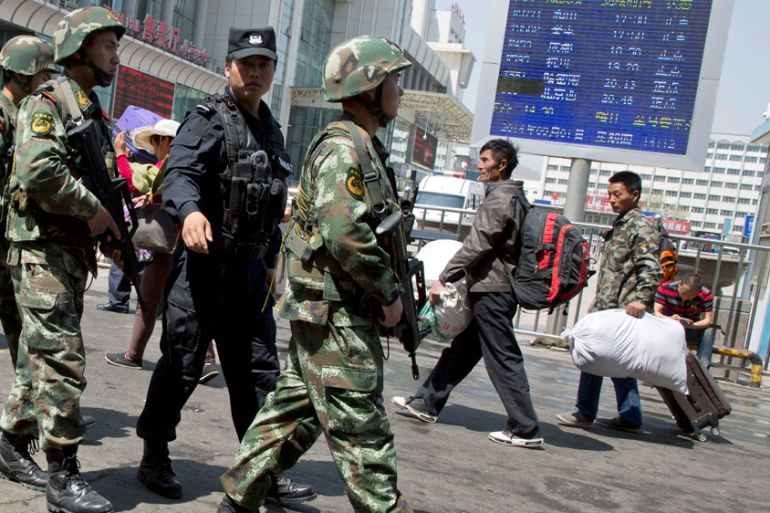China pledges new crackdown on ‘hostile forces’
Chinese courts convicted 1,419 people last year for national security and “terrorism” crimes, top judge says.

China’s courts severely cracked down on “terrorist” and secessionist activities last year and battling “hostile forces” in 2016 is a key priority with ethnic separatists and religious “extremists” in the crosshairs, officials said on Sunday.
Those who led, organised and took part in terrorist groups and who spread video and audio material about terrorism will continue to be targeted, a leading judge, Zhou Qiang, said.
Keep reading
list of 4 itemsSudan war could lead to more ethnic killings in volatile Darfur region
Why is Iran’s President Ebrahim Raisi visiting Pakistan?
Russia-Ukraine war: List of key events, day 788
This year courts “will implement well the laws on state security and counter-terrorism and severely punish terrorists and secessionists”, he added.
In a speech to the annual session of China’s national legislature, chief prosecutor Cao Jianmin also said that combating cybercrime and ensuring national sovereignty in cyberspace topped the list of 2016 priorities.
Prosecutors will continue to follow up on corruption cases as part of an almost three-year-old nationwide anti-corruption campaign spearheaded by the ruling Communist Party’s watchdog agency, he said.
|
|
| China sets new economic growth target at congress |
Although he identified no specific groups or individuals as threats, Beijing has in the past cited a long list of “hostile forces” it accuses of seeking to end communist rule and plunge China into chaos, division, and economic ruin.
Those include agents of foreign governments, civil society groups who challenge the party’s absolute authority, and religious dissenters – such as the underground church and the banned Falun Gong sect.
Those campaigning for ethnic rights are also frequently cited, including exiled Tibetan leader the Dalai Lama and advocates for the Turkic Muslim Uighur minority from the northwestern region of Xinjiang.
In an accompanying address to the legislature, Zhou said Chinese courts convicted 1,419 people last year of national security and “terrorism” crimes that carry potential death sentences. That compares with 712 people sentenced for incitement to separatism, terrorism and related charges in 2014, before last year’s passage of a sweeping new national security law.
Fighting corruption also remains a priority, with prosecutors handling 4,490 cases involving more than one million yuan ($154,000) last year, up 22.5 percent from 2014. That was out of a total of 54,249 officials investigated, Cao said.
Details weren’t given on new measures to prevent Chinese internet users from accessing overseas websites, something China insists is its innate right in order to protect its “national cyberspace sovereignty”.
China already blocks a wide range of foreign websites featuring news, research tools such as Google, social media including Facebook and Twitter, and file-sharing sites such as YouTube.
|
|
| The plight of the Uighurs |